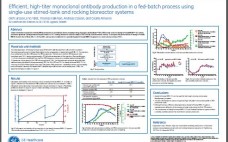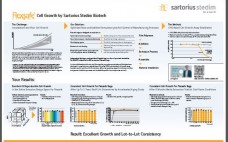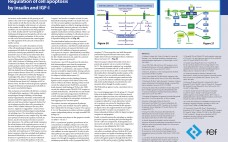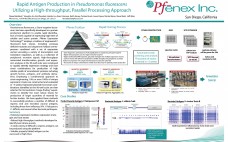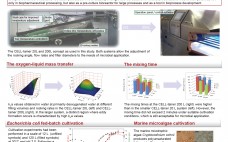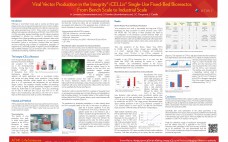Lymphocytes, expanded for clinical use, often consist of a small selected starting population, which requires multiple rounds of replication to achieve therapeutic doses. By using perfusion culture with the WAVE Bioreactor 2/10 System, high cell density cultures which are sufficient for therapeutic doses, can be generated. The Cellbagâ„¢ bioreactors, used together with the WAVE system, are functionally closed, single-use bioreactors that are delivered pre-sterilized and suitable for cGMP production. Perfusion is automatically maintained by the WAVE system, which removes metabolites…
Upstream Processing
Efficient High-Titer Monoclonal Antibody Production in a Fed-Batch Process Using Single-Use Stirred-Tank and Rocking Bioreactor Systems
This poster presents a study on the performance of two types of single-use in an antibody fed-batch process. The bioreactors were the stirred tank Xcellerexâ„¢ XDR-200 bioreactor and the rocking ReadyToProcess WAVEâ„¢ 25 bioreactor system. The cell line used was a CHO-DG44 derived antibody‑producing cell line and the base medium and feeds were from the ActiCHOâ„¢ media platform. The results from the parallel cultures presented in figures 3,4 and 5 show that cell growth, productivity and metabolism were very similar.…
In Silico and In Vitro Tools for the Rational Design and Optimization of Novel Vaccines
Subunit vaccines have been shown to have an excellent safety and stability profile compared to the more traditional inactivated or live attenuated vaccines. However, this increased safety is accompanied by the fact that subunit vaccines are often less immunogenic and require adjuvants to induce immunological memory. Comprehensive vaccine design and optimisation approaches can be used to identify the immunogenic parts of the pathogen that contain the B cell and T cell epitopes required for an immune response. Rationally designed vaccines…
New Flexsafe Bag Family: Combining Material Science, Film Expertise and QbD for Reliable and Consistent Cell Growth
The technical and economic benefits of single-use are well known and the bio-manufacturing industry is broadening their adoption in all steps of commercial production. This poster reviews the challenge of poor or inconsistent cell growth associated with the use of single-use bags for media storage and cell culture and how the solutions offered with the new Flexsafe bag family meet these new requirements. The poster introduces a new product development and supply chain management strategy that involves the use of…
Regulation of cell apoptosis by insulin and IGF-I
An increase in the number of cells growing in cell culture is the result of two opposing effects: an increase in the number of cells that traverse the cell cycle and divide into two daughter cells (mitosis), or a decrease in the number of cells that die according to different modalities, the most prominent one being apoptosis (1), or both. Insulin and IGF-I are both capable of facilitating cell progression through the cell cycle, and of inhibiting apoptotic mechanisms. In…
Continuous Bioprocessing: A CMO’s Perspective
The maturation of many process industries is marked by transition from batch to continuous processing. Often this move to con-tinuous processing determines the winners in the industry. Will the bioprocess industry go the same way? The analogy is often drawn to the chemical industry where continuous processing is widely applied. Although available for many decades continuous bioprocessing is not yet a mainstay of the industry. Currently there is a ground swell of feeling within the bioprocess industry that the time…
A Systematic Strategy of Cell Culture Media and Feed Development
Development of a high-performance and robust fed-batch process for recombinant Chinese Hamster Ovary (CHO) cell lines presents challenges in light of the diverse nutritional requirements observed with different clonally derived cell lines as well as the varied production phases. To address these challenges, we will discuss an innovative strategy of media, feed, and process development that has been developed at FUJIFILM Diosynth Biotechnologies (FDB). The efficiency and effectiveness of this strategy have been well demonstrated in multiple mAb-producing CHO cell…
Rapid Antigen Production in Pseudomonas fluorescens Utilizing a High-throughput, Parallel Processing Approach
Pseudomonas fluorescens, a Gram-negative bacterium, has been specifically developed as a protein production platform to enable rapid identification of strains capable of expressing high titers of soluble and active protein. PfÄ“nex Expression Technology (TM) employs a toolbox of engineered P. fluorescens host strains, including protease deficient mutants and chaperone/ foldase overexpressors combined with a set of expression vectors encoding a variety of transcription and translation regulators, as well as a collection of periplasmic secretion signals. High-throughput automated transformation, growth, and…
Microbial Cultivation In Different Scales in the CELL-tainer® Rocking Single-use Bioreactor
Single-use bioreactors are applied in the biopharmaceutical industry for mammalian cell culture processes. The low gas-liquid mass transfer coefficient generally achieved in these systems does not allow for the compatable application of microbial processes in these bioreactor systems. The CELL-tainer® technology combines a vertical and horizontal movement in a rocking bioreactor concept, so that the turbulence and power input is intensified. In this system, mass transfer rates comparable to stirred tank reactors are achievable. Thus, volumetric oxygen transfer rates (kLa)…
Viral Vector Production in the Integrity® iCELLis® Disposable Fixed-bed Bioreactor from Bench-scale to Industrial Scale
Recombinant viruses (e.g. lentivirus and adeno-associated-virus) can be used as human gene therapy vectors. They are mainly produced in adherent cell cultures (e.g. HEK293T, A549, VERO) in Roller Bottles or multiple-tray-stacks using either transient transfection or infection strategies. Therefore, the Integrity® iCELLis® (ATMI LifeSciences) line of bioreactors offers a new production alternative with stronger process controls and ease of scale-up. The iCELLis bioreactor is designed for adherent cell culture applications. Cells grow on microfibers carriers packed in a fixed-bed…


